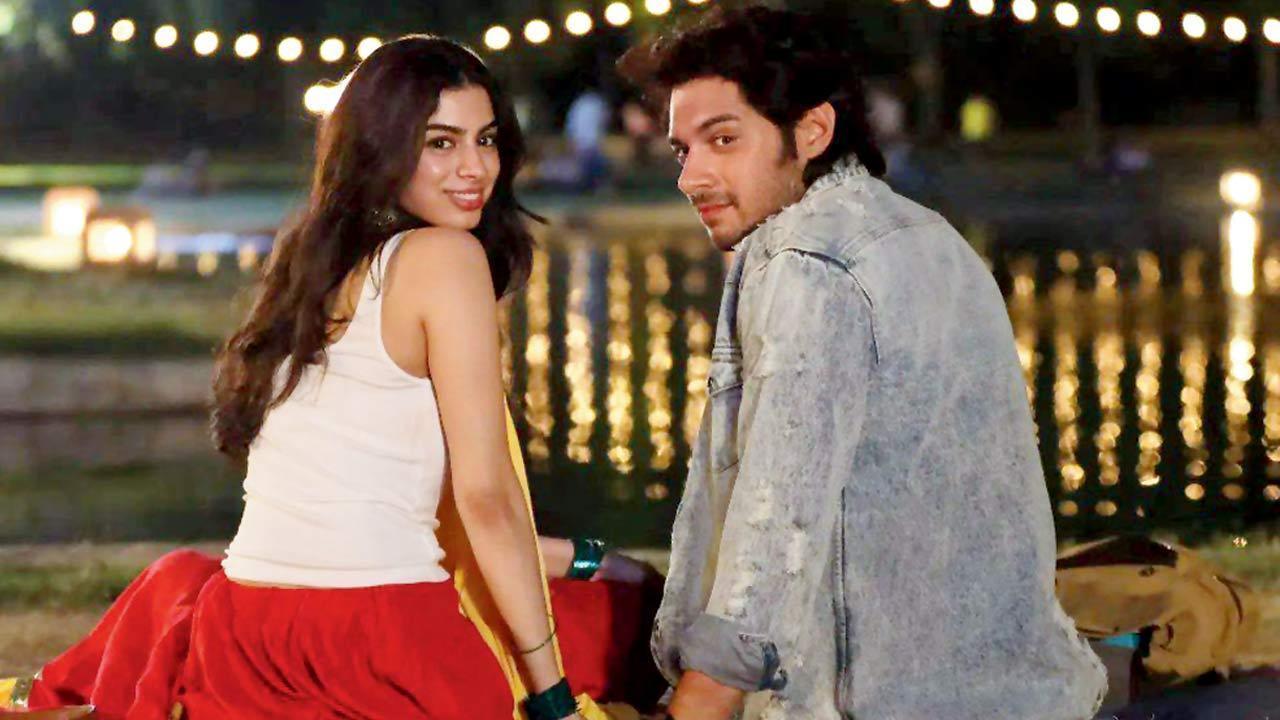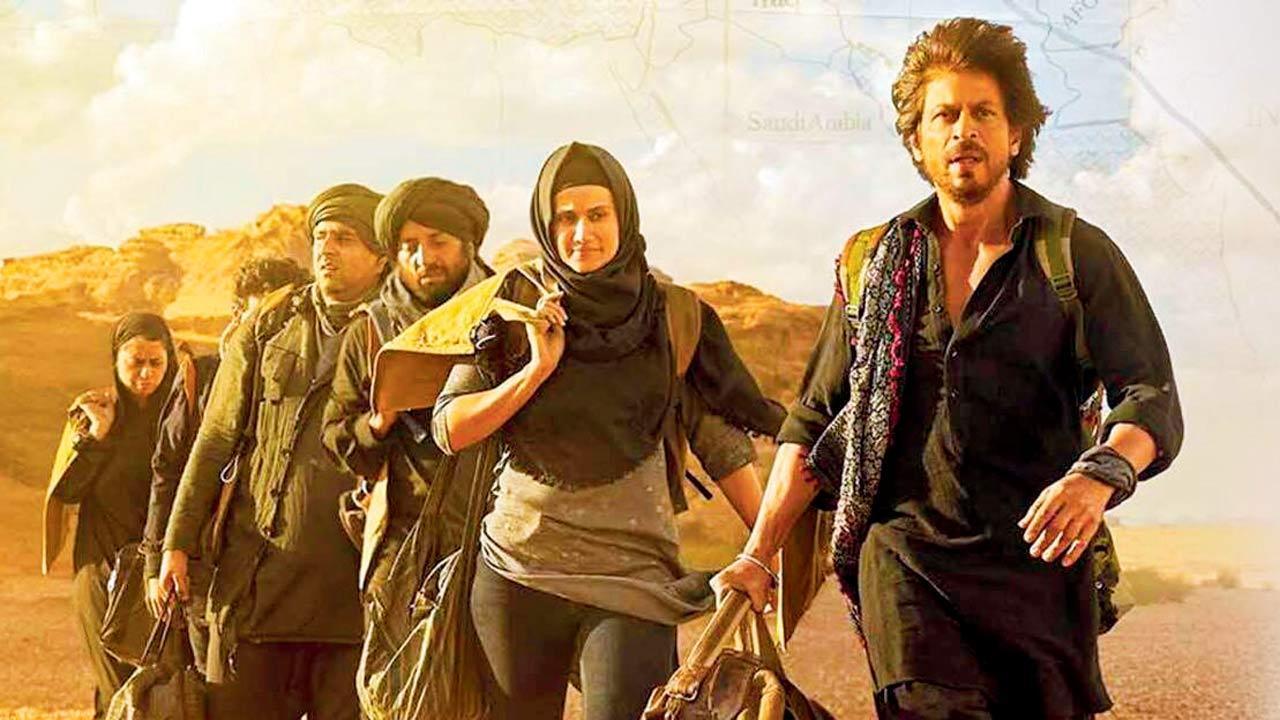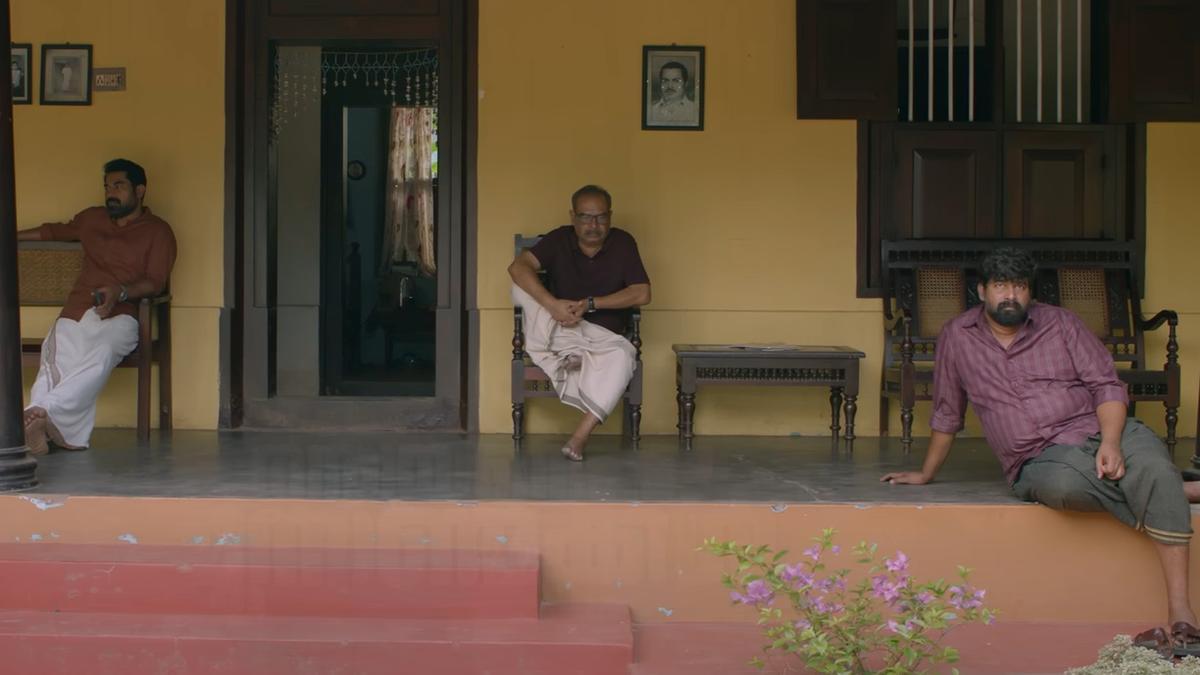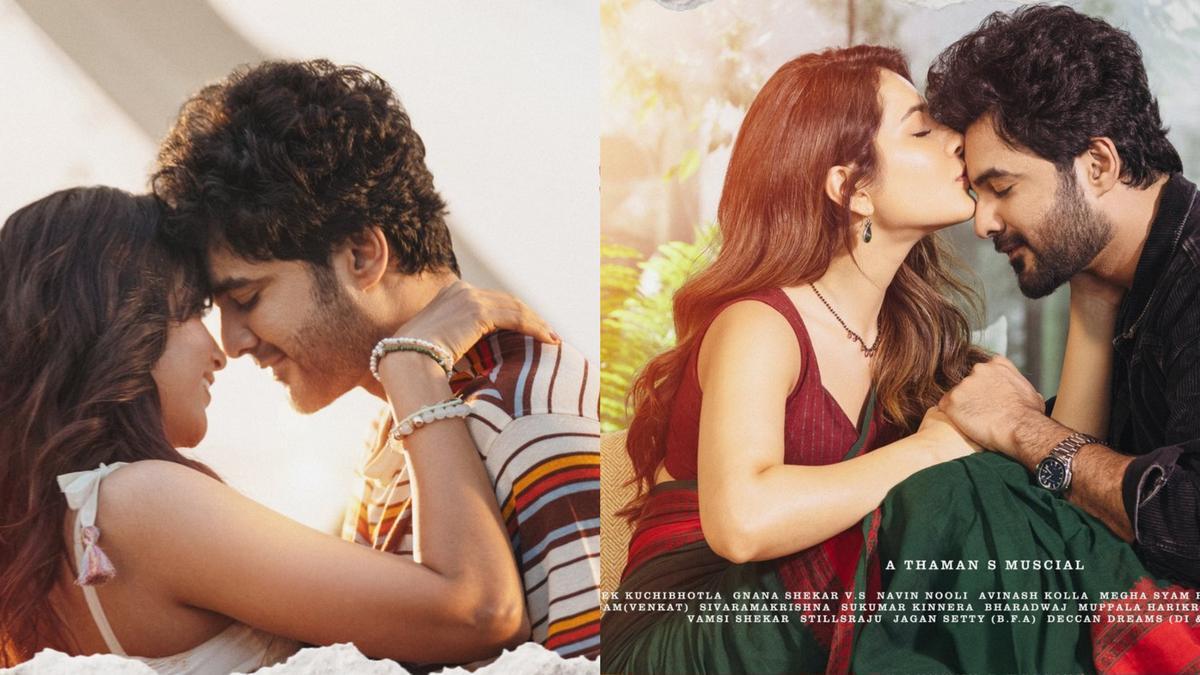
I don’t know to what extent does Loveyapa reveal lives of GenZ, in the times of Tinder, Bumble, Snap, Pure, Insta… It’s still very much a movie reflecting the world we live/love in.
A still from Loveyapa
LoveyapaU/a: Romance, comedyDir: Advait ChandanCast: Junaid Khan, Khushi KapoorRating: 3/5ADVERTISEMENTLoveyapa is a romcom, about a modern couple in their early/mid-20s, set to get married. The only conjugal hurdle is they swap their cellphone for some time, first.I’d deem this highly unadvisable. It’s a condition set by neither lovebird, but by the girl’s father. Why is that so significant? I suspect to truly dig into their prospective partner’s secret-lives—that everybody possesses, I suppose, besides a public life, and a private life.
Only, those secrets, somehow or the other, get stored in cellphones—for, what’s the phone now, if not an extension of your brain; but how deep within that should you dive into?
It’s not that the guy doesn’t lock his phone, or clean up data periodically. Girl’s dad (Ashutosh Rana) is dedh-shaana/over-smart. He wants to break open the lock, retrieve deleted stuff.
The pattern password (on the locked screen) is the letter ‘c’. “As in the Big C,” the boy tells his potential father-in-law. ‘Big C’ is what that dad thinks of the boy, anyway.
Which gets me to why this film is so poorly titled, Loveyapa—like the popular expletive with the same C! Opens up a bunch of terrible puns to do with this pic, that’s all.
Maybe it’s still better than the Tamil, Love Today (2022), which could be a magazine from the India Today group, that this film is an official remake of.
Either way, the effort here is to keep things suitably status-quo/PG-13, and simple—aimed at wider audiences, between smaller towns and bigger cities.
Wherein the loved-up couple, while surely dating for long, haven’t even kissed. To be fair, both have a past too; but sleeping around appears to have been totally out of the question.
I don’t know to what extent does Loveyapa reveal lives of GenZ, in the times of Tinder, Bumble, Snap, Pure, Insta… It’s still very much a movie reflecting the world we live/love in.
As the mother’s character puts it here, the phone equals choices. And that includes being with so many people at the same time.
Offline families in this ‘family film’ make for fine frames, starting with the tenderly hilarious, Ashutosh, as the latter-day ‘Amrish Puri’; something he played just as well in Humpty Sharma Ki Dulhania (2014), obviously inspired by Dilwale Dulhania Le Jayenge (1995).
There’s also the customary hero ke friends, with hardly any lives of their own, but the hero’s! The focus is on the main couple. As would be natural for a romance.
Do the leads in Loveyapa yap throughout? No. They’re rather restrained, in fact. Energy is hardly their strong suit. But they’re pleasant enough to shoulder an unpretentious story on the lives of Delhi’s accent-neutral, middleclass young.
I’m obviously referring to Junaid Khan, 31, and Khushi Kapoor, 24. Their Bollywood pedigree is well-known—Aamir Khan’s son, Sridevi’s daughter. They’re like neither parent onscreen. Which might be a good thing to avoid obvious comparisons.
Both had de-risked their film debuts, appearing first on Netflix. Maharaj (2024), for Junaid, that was a much better subject (to do with an episode from Bombay’s history), than a feature film, per se. Khushi played Betty Cooper in The Archies (2023) which was, by all accounts, hardly a popular hit.
God knows, Indian cinema needs a full constellation of young stars to replace top leads, touching 60! Do you sense a sizzling big-screen chemistry, since romantic movies are really where traditional cinema heroes/heroines get blooded first?
Well, I don’t know. You like these two, alright; sufficiently sweet, good-looking ’n all. The film, in its run up, doesn’t show how crazy they’re about each other—which would be essential for audiences to root for them to get together, eventually.
Sometimes, familiarity with the soundtrack helps with this genre to click in the head while you’re in the hall. I hadn’t heard any song, besides the title track, perhaps.
The lack of all which makes this a movie more about the phone, than love. This isn’t to suggest the cellphone isn’t central to our lives, and its potential conflicts. It’s a really important, contemporary subject, no doubt.
That’s also why/how Love Today—“story, screenplay, dialogue, lyrics, direction,” by Pradeep Ranganathan, who’s also the frickin’ lead actor in the original, therefore deserves all credit for this remake—was the sleeper-blockbuster of that year; apparently, made at R5 crore, topped Rs 100 crore, at the box-office.
There’s a fine line in that film, delivered by the father, which kinda explains why romantic films (romcoms being my favourite genre), went through an existential crisis, circa 2000 onwards.
He says, “20 years ago, only one out of 10 couples would end up marrying. Rest of them got separated by their parents. The numbers are the same today. But now, parents don’t separate the couples. You guys do it yourselves.”
As you can tell from my fresh memory, I watched Love Today (on Netflix), right after Loveyapa, in the theatre. Basically, I watched the same film, twice. You must watch either. Personally? I prefer theatres.
ADVERTISEMENT
Loveyapa is a romcom, about a modern couple in their early/mid-20s, set to get married. The only conjugal hurdle is they swap their cellphone for some time, first.
I’d deem this highly unadvisable. It’s a condition set by neither lovebird, but by the girl’s father. Why is that so significant?
I suspect to truly dig into their prospective partner’s secret-lives—that everybody possesses, I suppose, besides a public life, and a private life.
Only, those secrets, somehow or the other, get stored in cellphones—for, what’s the phone now, if not an extension of your brain; but how deep within that should you dive into?
It’s not that the guy doesn’t lock his phone, or clean up data periodically. Girl’s dad (Ashutosh Rana) is dedh-shaana/over-smart. He wants to break open the lock, retrieve deleted stuff.
The pattern password (on the locked screen) is the letter ‘c’. “As in the Big C,” the boy tells his potential father-in-law. ‘Big C’ is what that dad thinks of the boy, anyway.
Which gets me to why this film is so poorly titled, Loveyapa—like the popular expletive with the same C! Opens up a bunch of terrible puns to do with this pic, that’s all.
Maybe it’s still better than the Tamil, Love Today (2022), which could be a magazine from the India Today group, that this film is an official remake of.
Either way, the effort here is to keep things suitably status-quo/PG-13, and simple—aimed at wider audiences, between smaller towns and bigger cities.
Wherein the loved-up couple, while surely dating for long, haven’t even kissed. To be fair, both have a past too; but sleeping around appears to have been totally out of the question.
I don’t know to what extent does Loveyapa reveal lives of GenZ, in the times of Tinder, Bumble, Snap, Pure, Insta… It’s still very much a movie reflecting the world we live/love in.
As the mother’s character puts it here, the phone equals choices. And that includes being with so many people at the same time.
Offline families in this ‘family film’ make for fine frames, starting with the tenderly hilarious, Ashutosh, as the latter-day ‘Amrish Puri’; something he played just as well in Humpty Sharma Ki Dulhania (2014), obviously inspired by Dilwale Dulhania Le Jayenge (1995).
There’s also the customary hero ke friends, with hardly any lives of their own, but the hero’s! The focus is on the main couple. As would be natural for a romance.
Do the leads in Loveyapa yap throughout? No. They’re rather restrained, in fact. Energy is hardly their strong suit. But they’re pleasant enough to shoulder an unpretentious story on the lives of Delhi’s accent-neutral, middleclass young.
I’m obviously referring to Junaid Khan, 31, and Khushi Kapoor, 24. Their Bollywood pedigree is well-known—Aamir Khan’s son, Sridevi’s daughter. They’re like neither parent onscreen. Which might be a good thing to avoid obvious comparisons.
Both had de-risked their film debuts, appearing first on Netflix. Maharaj (2024), for Junaid, that was a much better subject (to do with an episode from Bombay’s history), than a feature film, per se. Khushi played Betty Cooper in The Archies (2023) which was, by all accounts, hardly a popular hit.
God knows, Indian cinema needs a full constellation of young stars to replace top leads, touching 60! Do you sense a sizzling big-screen chemistry, since romantic movies are really where traditional cinema heroes/heroines get blooded first?
Well, I don’t know. You like these two, alright; sufficiently sweet, good-looking ’n all. The film, in its run up, doesn’t show how crazy they’re about each other—which would be essential for audiences to root for them to get together, eventually.
Sometimes, familiarity with the soundtrack helps with this genre to click in the head while you’re in the hall. I hadn’t heard any song, besides the title track, perhaps.
The lack of all which makes this a movie more about the phone, than love. This isn’t to suggest the cellphone isn’t central to our lives, and its potential conflicts. It’s a really important, contemporary subject, no doubt.
That’s also why/how Love Today—“story, screenplay, dialogue, lyrics, direction,” by Pradeep Ranganathan, who’s also the frickin’ lead actor in the original, therefore deserves all credit for this remake—was the sleeper-blockbuster of that year; apparently, made at R5 crore, topped Rs 100 crore, at the box-office.
There’s a fine line in that film, delivered by the father, which kinda explains why romantic films (romcoms being my favourite genre), went through an existential crisis, circa 2000 onwards.
He says, “20 years ago, only one out of 10 couples would end up marrying. Rest of them got separated by their parents. The numbers are the same today. But now, parents don’t separate the couples. You guys do it yourselves.”
As you can tell from my fresh memory, I watched Love Today (on Netflix), right after Loveyapa, in the theatre. Basically, I watched the same film, twice. You must watch either. Personally? I prefer theatres.










